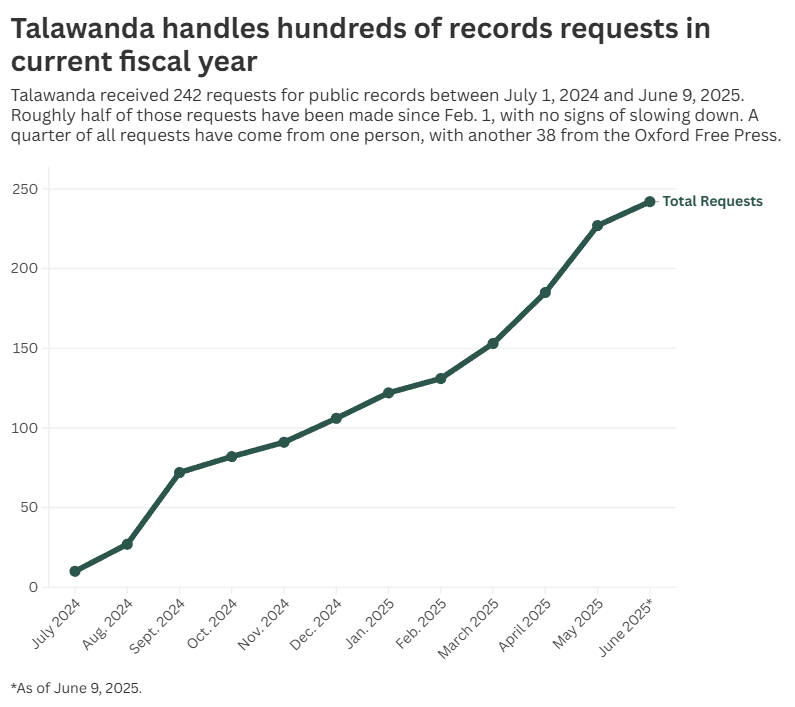District creates new position to handle increased records requests
The Talawanda Board of Education voted in favor of a new position to help process records requests, which have increased drastically in the past year.

The Talawanda Board of Education has voted 4-1 to create a new part-time records specialist position after a year of high-volume and complex public records requests.
Between July 1, 2024, and June 9, 2025, the district has received more than 240 requests for public records, the district records log shows. Those requests range from easy-to-fulfill items like the records log itself (requested more than 15 times, including by the Oxford Free Press) to much more in-depth requests for emails and investigations dating back years. Two outstanding requests from May asked for all emails to and from board member Matt Wyatt’s Talawanda account since his appointment.
The new position, approved during a June 19 meeting, will be dedicated to handling requests. Employment will be on an as-needed basis up to 25 hours per week, paid an hourly rate of $25 to $35. Board member Dawn King voted against creating the position.
How record requests work now
By state law, public school districts in Ohio are required to maintain public records related to district business and provide those records within a “reasonable period of time” to anyone who requests them. Certain records are subject to redactions, including personally identifiable student information in some contexts and medical information.
At Talawanda, requests are primarily handled by the treasurer’s office. Treasurer Shaunna Tafelski said in an interview with the Oxford Free Press that she serves as the first contact for requests. To find responsive records, she coordinates with departments and IT staff, and Tafelski herself then typically makes the first redactions for personally identifiable information, addresses and other sensitive information.
That system may have been manageable in the past, but Tafelski said it’s become increasingly hard to keep up with the number of complex requests that return hundreds or thousands of individual records.
The volume of requests is an outlier both for Talawanda and for area school districts generally. In the previous three fiscal years, the number of requests hovered around 33 for Talawanda — above the totals in those years for six out of seven Butler County school districts with records logs reviewed by the Free Press. Only Fairfield had more, topping out at 85 requests in fiscal year 2023, a total Talawanda now dwarfs.
Requests in the past year have also gotten more sensitive. Title IX reports and student threat assessments have been requested multiple times since last July. Last fall, the board voted 4-1 to fund a new records process that would rely on district attorneys to fulfill requests. Tafelski said using attorneys doesn’t make financial sense for most requests, though, so they only get involved on the most sensitive ones. Even if the district did rely primarily on attorneys, Tafelski said, district staff would still have to find the responsive documents and review redactions.
“If we still have questions, if we need them to proof our redacted document, sometimes we are doing that,” Tafelski said. “But we are still handling the bulk of the documents because there is still that Talawanda human element that has to be involved.”
Between Jan. 21 and May 31, Tafelski said she spent the equivalent of three weeks in Logikcull — a redaction software for emails — alone. That doesn’t account for finding records, coordinating with attorneys or redacting documents outside of Logikcull. Tafelski and two others have spent a total of 242 hours in Logikcull alone in that time frame.
“I’m still having to get my job done,” Tafelski said. “That’s three additional weeks I’m spending on [requests], and that’s just in Logikcull. That’s not organizing, reviewing, being a first redactor with a highlighter.”
The nature of the requests
All requests are tracked in a public records log. This year, Tafelski began tracking requests for separate sets of records made at the same time as separate requests.
An analysis of the logs by the Oxford Free Press found that since last July, three-quarters of the 242 requests have come from the Free Press itself, current board members, anonymous or alias accounts or one of nine individuals. Scotty King, husband of current board member Dawn King, made 63 requests in that time, more than anyone else. He did not respond to a request for comment for this story.
One Free Press request for documents provided to other individuals in specific requests, as well as details of an investigation and legal fee invoices, was counted as 16 separate requests.
A narrowly focused request, like for the records log itself, can be fulfilled quickly. Complicated requests, like the two made for Wyatt’s entire inbox, are much more resource-intensive. As of June 9, those requests made on May 11 and 19 were unfulfilled.
Public entities can reject requests that are overly broad. Tafelski had already begun fulfilling the first request for Wyatt’s entire inbox before she thought to ask the requester to narrow it, though, and plans to fulfill both. After that, though, she said the requesters will be notified that future, similar requests will be rejected.
On at least 12 separate occasions, individuals have requested emails and text messages from administrators and board members that mention themselves or their family members. Title IX investigations have been requested at least nine times, including one request asking for all investigations dating back six years (the Free Press has previously asked for records provided to others in response to specific Title IX investigations, as well as one request for results of investigations into administrator conduct).
A new position
To account for the high volume of records, the new part-time position will focus solely on fulfilling requests. The position is on an as-needed basis for up to 25 hours per week.
The decision to add a new position comes as the district is bracing for the financial impact of the state budget. During the same meeting where the position was approved, the board voted unanimously not to create a new position in IT. Last month, the board voted to move millions of dollars out of the general fund; Ohio lawmakers have proposed caps on how much districts can save in the general fund each year.
Despite the financial burden, board member Chris Otto said the position is necessary. Right now, he said, Tafelski is splitting time between fulfilling requests, closing out the fiscal year and monitoring the state budget. The new position will allow her to focus more on the district’s finances, she said.
“I find it outrageous, quite frankly,” Wyatt agreed. “I’m a big believer in public records … but when you have a situation where it’s not oversight, when it’s not good faith, when it’s a form of intimidation and clogging up the system, because that’s exactly what it is … it’s ridiculous.”
Talawanda has not yet identified a candidate for the position. If the state budget does end up putting a bigger burden on public schools, board president Rebecca Howard said they can pull back on the position.




